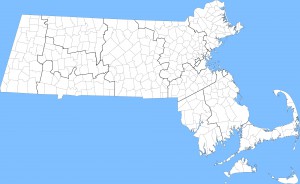
Massachusetts is one of a handful or so states that allow relatively open access to vital information. It is certainly possible to conduct family research after 1930 for Massachusetts using a combination of resources. FamilySearch.org provides free access to its record image and index databases that encompass records from around the world. Databases specific to Massachusetts are available at https://familysearch.org/search/collection/list/?page=1&countryId=52.
Also available at this website are the 1940 U.S. Census record images, at https://familysearch.org/1940census. Researchers should explore the other U.S. states databases on this site, as more record images and whole databases are continually added throughout the year. Access to Ancestry.com is often available at many public libraries, and I recommend accessing these databases for post-1930 Massachusetts vital records:
- Massachusetts Birth Indexes, 1901-1950+, http://search.ancestry.com/search/db.aspx?dbid=3928
- Massachusetts Marriage Indexes, 1901-1955, 1966-1970, http://search.ancestry.com/search/db.aspx?dbid=2966
- Massachusetts Death Indexes, 1901-1980, http://search.ancestry.com/search/db.aspx?dbid=3659
- Massachusetts Town and Vital Records, 1622-1988, http://search.ancestryinstitution.com/search/db.aspx?dbid=2495
Please be aware that not all years may be available for a given town in the MA Town and Vital Records or the MA City Directories collections. After 1921, the complete copy of vital records are accessed either from the town or city clerk’s office of the town/city recording the event or from the Massachusetts Registry of Vital Records and Statistics (150 Mount Vernon Street, Dorchester, MA 02125; phone: (617) 740-2600; web: www.mass.gov/dph/rvrs. The volume and page references listed in the MA Birth, Marriage and Death Indexes are retrievable from the Massachusetts Registry of Vital Records and Statistics only. Information about obtaining certified copies of vital records from the Registry can be found on their website.
City directories are another source for tracking residents in particular cities in Massachusetts. While not every year may be available for the towns and cities you are focusing on, the Ancestry.com collection of Massachusetts City Directories, http://search.ancestryinstitution.com/search/db.aspx?dbid=8779, may be useful. In particular, when the publisher’s agent is informed of a person’s death date during the verification phase of the project, the death date will be included in that person’s entry in the city directory in the relevant year.
Locating obituaries and death notices will net you the names and residential locations of the surviving members of a deceased person’s family. The best collection of Massachusetts newspapers on microfilm is held by the Microtext Department of the Boston Public Library (700 Boylston Street, Boston, MA 02116; phone: 617-859-2018; web: http://www.bpl.org/research/microtext/). Listings of their Boston and Massachusetts newspaper microfilms are available at http://www.bpl.org/research/microtext/BostonNewspapers.pdf and http://www.bpl.org/research/microtext/MassNewspapers.pdf, respectively.
Reference requests are accepted by the Microtext staff, but the turnaround time may be six to eight weeks or more. For newspapers elsewhere in the United States, the Library of Congress’ Chronicling America website has a searchable directory of U.S. newspapers at http://chroniclingamerica.loc.gov/search/titles/ to locate what is available for the area and time of your study as well as libraries having related holdings.
BOOKMARKED under Genealogy->Massachusetts! Thanks! Saves me from re-thinking Ancestry’s “library” system of how not to find things, plus all the other sites I’ve either heard of or visited but don’t have separately bookmarked. Pretty please with sugar on top: Can you do this for the other NE states, too?